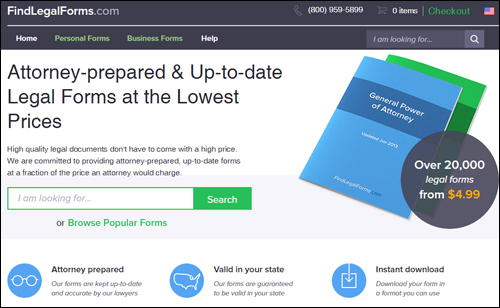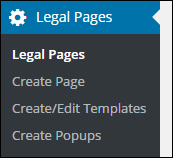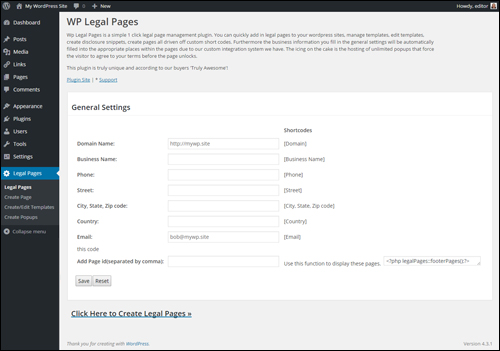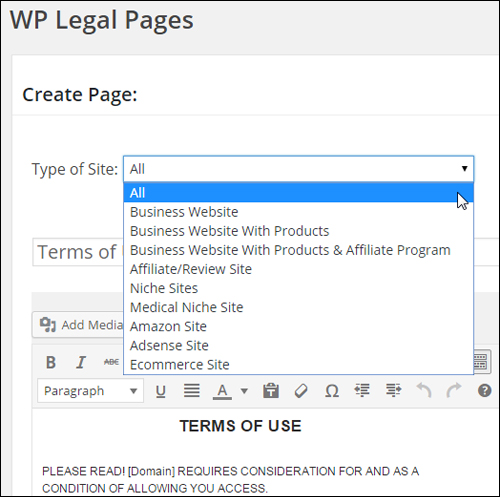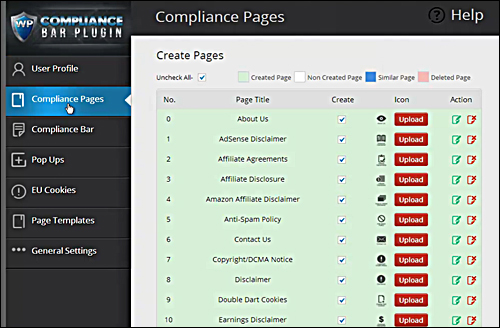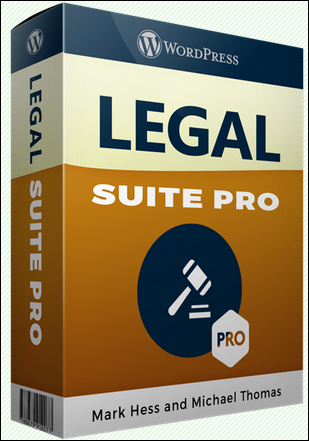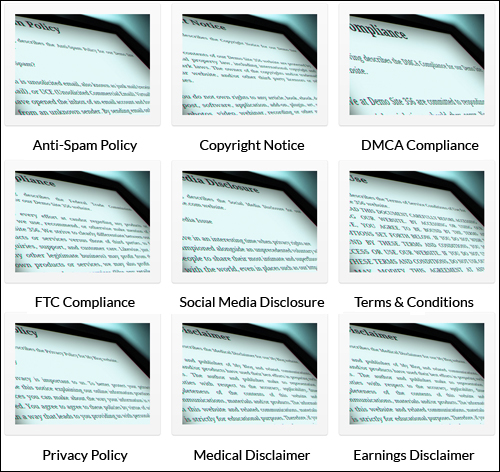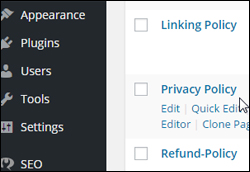
Is your WordPress website compliant? Do you know if your site is breaking any laws, rules or regulations, or breaching the Terms of Service (TOS) of any companies whose services or products you are offering or endorsing?
Internet laws and regulations were designed to protect the rights of consumers and apply to anyone who markets, sells or promotes goods or services online. Anyone who owns a website risks being sued for not following compliance laws. Feigning ignorance about legal requirements won’t prevent you from being slapped with a legal notice.
New laws introduced in 2014 regulating how businesses promote advertising on their sites clearly state that if you plan to promote anything on your site for material gain, then you will need to follow certain principles of disclosure to prevent enforceable orders being issued against you by consumer protection departments, such as the (US based) Better Business Bureau, also known as BBB. Do a search online for “The Online Interest-Based Advertising Accountability Program,” which regulates behavioral advertising across the internet to learn more.
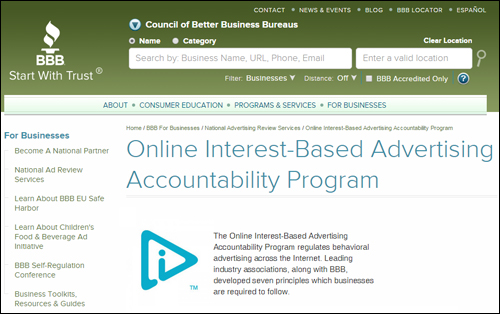
(BBB – Online Interest-Based Advertising Accountability Program)
The introduction of these new laws has implications for several online business categories, including:
- Any type of advertising, e.g. Google AdWords
- Retarget Marketing
- Google Analytics (or other analytics software)
- Affiliate Marketers
- Product Creators
- Blogging
- etc.
If your website does not display certain pages to visitors (e.g. terms of service, privacy policy, legal disclaimers, etc.), many sites like Google won’t let you advertise, digital marketplaces like ClickBank or JVZoo won’t let you list digital products on their network, PayPal may shut down your account and freeze your funds, Facebook could reject web applications, and you won’t be accepted into many advertising or affiliate marketing networks.
If your online business is not in compliance, you could also face a multitude of penalties, including fines, having your website shut down, even jail time!
In this article, we discuss the importance of having a legally compliant website and list simple methods and solutions that will help make your WordPress site compliant quickly and easily.

Does Your Website Comply With All Legal Requirements?
![]()
Legal Disclaimer: We are not lawyers and we do not offer legal advice. As stated earlier, the purpose of this article is to make you aware that your website may be subject to a number of legal requirements in accordance with federal, regional or local laws and regulations governing online business practices and that you may be required to comply with the terms of service of third-party companies whose products or services you offer on your website or blog
Why Ensuring That Your Website Is Compliant Is Important
Is your business at risk? Consider for a moment what could happen to your business if these scenarios were to take place:
- Someone has a heart attack after using your online fitness workout.
- The skin care creams you promote as an affiliate marketer gives someone who purchases from your link skin rashes.
- You’ve let your subscribers know that you will not sell their information, but you haven’t defined what you plan to do with their details.
- Someone copies your content and puts it up on their own website.
- There is no statement on your website letting your visitors know that you are endorsing a product as an affiliate and could derive an affiliate commission if they purchase it.
- You haven’t spelled out the conditions of your refund policies.
- Your visitors claim your testimonials are misleading and decide to sue you.
- You didn’t disclose in a product review that you were given a free copy of the product.
- Your site includes adult content and you haven’t taken appropriate measures to restrict access by underaged children.
Consider also these documented examples of costly compliance breaches:
- A CPA Marketer failed to provide adequate disclaimers telling visitors they would be required to give up personal information to complete a debt reduction offer. In addition to a significant $390,000 fine, he was also ordered to give a copy of the judgement to everyone they do business with for the next 20 years — including employees.
- A social networking app developer received a whopping $800,000 fine for collecting personal information from mobile device address books without the owners’ knowledge and consent – including storing private information about children.
- Facebook’s Terms Of Service does not allow users to scrape Users IDs. Many internet marketers gambled that they could get away with it and lost. Their accounts were shut down, costing them thousands of $$$ in lost revenue.
- An independent study by Brad Geddes of SearchEngineLand, showed that, of a couple of hundred randomly-chosen websites, more than 90% had broken at least one of Google’s policies, more than 65% were in violation of at least two of Google’s policies, and more than 40% were in breach of at least 3 of Google’s policies. Although the website owners could technically be sued by Google, more than likely what could happen, is that they would be issued cautions or lose access entirely to the Google program they had violated, which could result in loss of income (e.g. AdSense or AdWords).
Can you see how easy it is to risk being a target of litigation?
Regardless of whether you are a:
- CPA (Cost Per Action) or CPC (Cost Per Conversion) Marketer
- Network Marketer
- Affiliate Promoter
- AdWords User
- Niche Marketer
- Amazon Affiliate
- e-Commerce Store Owner
- Publisher Of Adult Content
- Freelancer, Consultant Or Coach
- Seller Of Any Service Or Product Online
It’s imperative to ensure that your digital presence has the right legal pages and information accessible to all you site visitors.
Complying With Third-Party Companies
Leading online companies and government agencies that regulate trade in most countries emphasize the importance of complying with the terms and policies of 3rd-party service providers.
You must let your visitors know that your business complies with all necessary laws and professional guidelines. This not only increases consumer trust and buyer confidence in your business, it’s also a requirement of many companies you do business with.
Here are just some examples:
Google requires your site to display certain information if using their products. This includes Google Analytics …
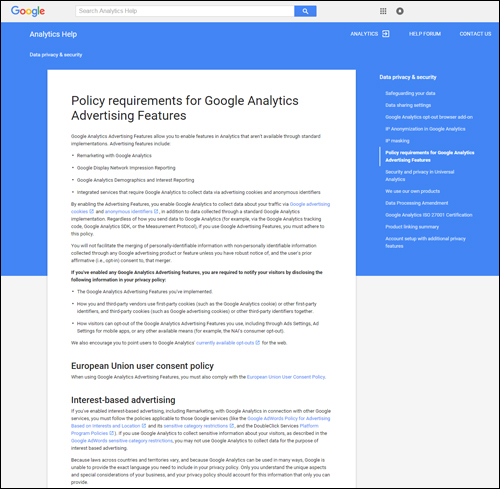
(Google Analytics – Policy Requirements)
Earning revenue online with your website with Google AdSense display advertising …
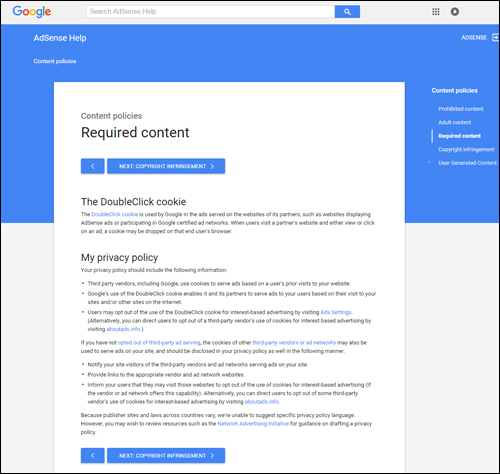
(Google AdSense ads - policy requirements)
And even promoting your products through Google AdWords …
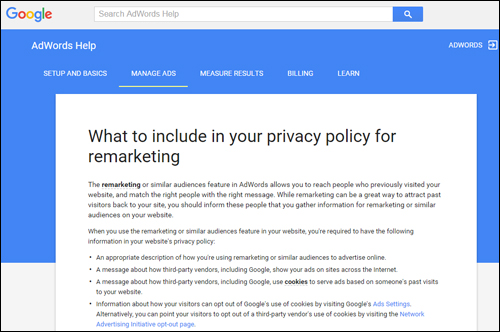
(Google AdWords – Policy Requirements)
If you plan to sell digital products using merchants such as ClickBank, JVZoo, or other established merchant networks, you are required to add certain legal pages before they will approve your products for sale in their networks …
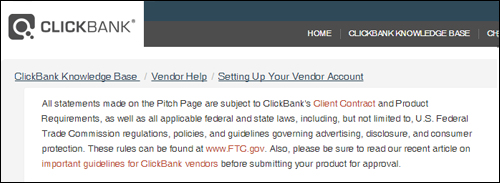
(ClickBank – policy requirements for digital product vendors)
The Federal Trade Commission also requires that you include clear disclaimers and policy statements on your site, especially regarding the use of product testimonials or endorsements …
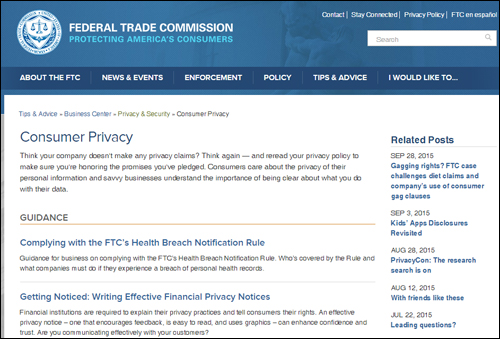
(Federal Trade Commission – consumer guidelines and regulations)
New FTC Regulations Require Your Site To Comply
New FTC regulations governing the conduct of doing business online were introduced in March 2012. A quick search online will reveal that many business are still unaware (or choose to ignore) these requirements. As has already been the case, this will most likely prompt the FTC to make an example of businesses and prosecute site owners for breaches of regulation in an effort to get other businesses to comply.
If you plan to do any kind of money-making activity online, therefore, it’s best not to take any chances. Even if your business is not located in the U.S. we strongly recommend protecting your business by making sure that your website is compliant with FTC regulations and guidelines.
There are many resources online that can provide guidelines for structuring disclaimers and disclosures to help you meet FTC requirements. We provide additional references and links to useful resources at the end of this article …
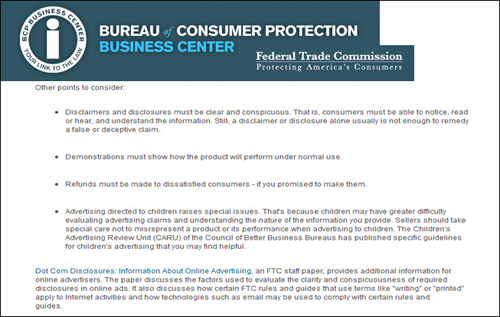
(Word your disclaimers and disclosures correctly to avoid running foul of the law)
Social Media Applications Also Require Compliance
If you plan to create applications that integrate with your website, you will also be required to provide social networking sites like Facebook, Twitter, and others with access to your legal pages …
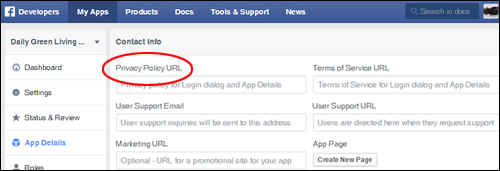
(Apps for social networks also require compliance)
![]()
- If you are unsure as to whether or not you are breaking the law, and/or Terms of Service policies and guidelines of websites like Google, Facebook, etc., then it’s best to assume that you most probably are.
- If you are considering promoting products or services on your site as an affiliate marketer, or generate revenue with Google AdSense, ads for Amazon or eBay products, or driving visitors to your website with Google AdWords, etc., then find out exactly what kind of legal information you need to include on your site to comply with all Terms Of Service and policy requirements - don’t risk having your accounts shut down.
- If you’ve been wondering if “borrowing” a Copyright Notice is Copyright infringement, take proper precautions to avoid becoming a litigation magnet.
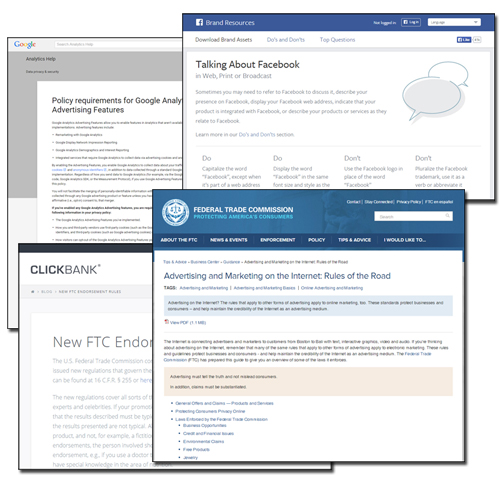
(In addition to legal and regulatory compliance, almost all 3rd-party websites require you to comply with their policies and guidelines)
What Legal Pages Do You Need To Add To Your Site To Be Compliant?
If your website or blog is falling short in areas of compliance, then you will find this section helpful.
At its most basic, adding the following legal pages to your site should help keep your business out of trouble with most consumer protection authorities and third-party service providers, and even help to avoid potential legal issues or even threats of legal action (e.g. “takedown” notices):
- About Us Page
- Contact Page
- Privacy Statement
- Terms Of Use
- Disclaimer Pages
- General Data Protection Regulation (GDPR) Compliance
In addition to the pages above, you may want to consider implementing any of these compliance pages if applicable:
- Affiliate Agreement (if you sell products or services through an affiliate program)
- Anti-Spam Policy
- Compensation Disclosure
- External Links Policy
- Financial Disclaimers (if your website or blog provides money-making advice)
- Refund Policy (if you run an e-commerce site)
- Media Terms Of Use (e.g. if you allow media downloads on your site)
Disclosure Pages – Types
It’s important to add correct disclosure information to your website. For example:
- No Material Connection – Lets readers be aware that you will not receive any kind of compensation for writing the post.
- Affiliate Links – Disclosure that informs your readers that you may benefit financially if they purchase through your affiliate link.
- Sample Or review Copy – Lets site users know that you have received a review or sample copy of the product you’re writing about.
- Sponsored Post – Discloses to users that you were compensated in some way to write the post.
- Third Party Advertising – Informs visitors that you’re using online behavioral tracking technology. This is required to comply with the “enhanced notice” the Better Business Bureau has been requiring website publishers to show prominently on their sites since January 1, 2014.
How To Add Compliance Pages To Your Site
Ideally, you will have a lawyer prepare the content of your legal documents. Once these have been completed, there are several ways to include them in your website.
Uploading Legal Pages To Your Site
If someone prepares and delivers the legal verbiage for you in standard web page formatting (e.g. HTML), you can simply upload these to your web server, or have someone upload them for you.
We recommend adding a legal folder to your web server and uploading HTML pages containing your legal documentation to this folder via FTP …
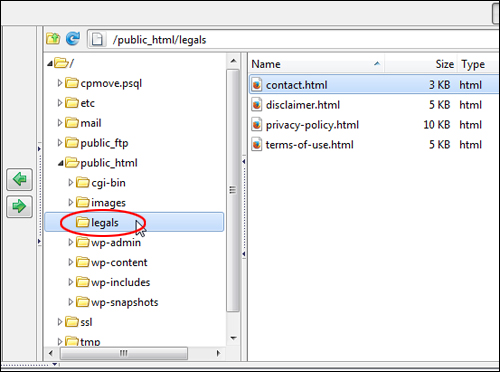
(Upload legal pages to your web server via FTP)
You can then easily add a link to these legal pages in WordPress using a custom WordPress menu …
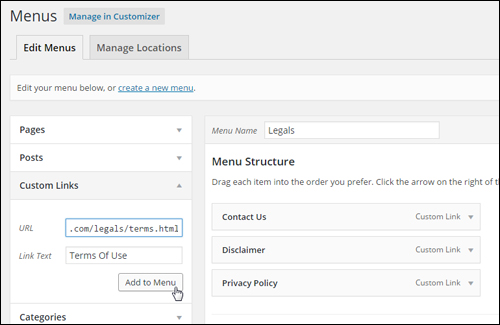
(WordPress Menu)
Where To Display Legal Web Pages On Your Site
After uploading your legal pages, make sure that these are up-to-date and clearly accessible to your visitors. You can insert links to your legal pages into the sidebar (or place them in the footer of your site) to ensure that users can access the information from all of your web pages …
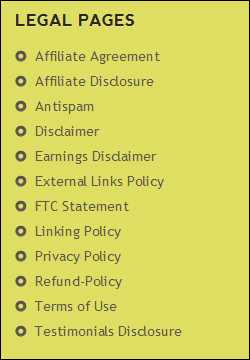
(Display links to your legal information on all of your site’s pages)
For a detailed tutorial about displaying links to pages on your sidebar, see this tutorial:
Legal Templates
You can find attorney-drafted disclosures and downloadable website forms and agreements just by searching online, or visiting websites like this one:
Find Legal Forms
(Find Legal Forms)
More information:
Alternatively, you can download a package of website legal templates designed by legal attorney Scott Talbert to protect businesses online …
Cut And Paste Website Legal Pages
(Website Legal Pages)
Cut & Paste website templates were created by an attorney and feature less passive voice and more plain language phrasing and can be easily customized with a quick search and replace to insert your own business name and URL, then pasted into your web pages.
The legal templates included in Scott Talbert’s Legal Pages include:
- Anti-Spam Policy
- Copyright Notice
- Disclaimer
- DMCA Compliance
- Federal Trade Commission Compliance
- Privacy Policy
- Terms of Service & Conditions of Use.
You can either create a new WordPress page for each legal form you want added to your site, then paste the content from the templates into your pages and publish or upload your legal pages to your server as described previously.
Visit this website for more information:
Plugins – Legal Pages
As well as using legal templates, you can keep things very simple by using WordPress plugins.
Here are some plugins for WordPress users you may be interested in checking out:
WP Legal Pages
(WordPress Plugin – WP Legal Pages)
If you don’t want to spend time creating legal web pages manually, then consider using WordPress Legal Pages …
This plugin is not free, but it’s a very affordable and well-supported premium WordPress plugin that will make the job of creating and implementing legal pages on your WordPress site a lot easier and save you many headaches.
Some of the benefits of using the WordPress Legal Pages are:
- Built-in Legal Templates – Over 20 built-in legal templates created by a team of professional lawyers.
- Very Quick And Easy To Use – You can set up most of your basic legal pages in a few minutes with a few clicks of the mouse.
- Fully Customizable Pages – Includes customizable and editable legal form templates (e.g. Terms Of Service, Disclaimer, Earnings Disclaimer, Privacy Policy and more!)
- Editable Pages – WYSIWYG editor lets you edit legal pages like any other WordPress page.
- Custom Shortcodes – You can add shortcodes to your pages and the information will be automatically inserted into your pages when published.
- Exclude pages. The plugin lets you exclude pages from menus with a simple checkbox and delete and manage these like every other page on your site.
- Forced Options – Force page or post lockdown. When users agree to the legal terms, the page unlocks.
- New Features – New plugin features get added when new versions are released.
After installing WordPress Legal Pages, a new menu feature is added to your WordPress dashboard menu section …
(WP Legal Pages Plugin – Legal Pages Menu)
This allows you to create, view and edit your legal pages from the admin area …
(WP Legal Pages Plugin – Settings)
With WPLegal Pages, you have the option of easily creating legal pages for different types of sites, such as business websites, affiliate/review websites, AdSense sites, etc …
(WP Legal Pages Plugin For WordPress – Create different legal page types)
You can also choose from a number of built-in legal templates …
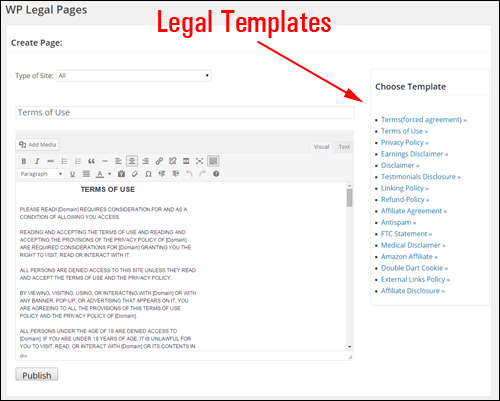
(WP Legal Pages Plugin – Legal Templates)
Legal page templates include:
- Terms of Use (Users are forced to agree to Terms and Conditions before using site)
- Linking Policy
- External Links Policy
- Terms and Conditions
- Refund Policy
- Affiliate Disclosure
- Privacy Policy
- Affiliate Agreement
- Facebook Privacy Policy
- Earnings Disclaimer
- Antispam Policy
- DoubleClick DART Cookies Policy
- Disclaimer Template
- FTC Disclosure Statement Template
- Medical Disclaimer Template
- Testimonials Disclosure – As per FTC guidelines
- Amazon Affiliate Disclosure Template
- DMCA Policy Template
- California Privacy Rights Policy Template
- Digital Goods Refund Policy Template
- COPPA – Children’s Online Privacy Policy Template
- Blog Comments Policy Template
- Newsletter Subscription Policy and Disclaimer Template
- FTC Disclaimer Widget
For more information about the benefits of using this plugin, go here:
Compliance Bar Plugin – Compliance Plugin For WordPress
The Compliance Bar Plugin For WordPress is a total compliance & disclaimer solution for your digital presence …
For a detailed article about this plugin go here:
Legal Suite Pro
(Legal Suite Pro For WordPress)
This plugin lets you easily install professionally-written legal pages such as:
- Anti-Spam Policy
- Copyright Notice
- DMCA Compliance
- FTC Compliance
- Privacy Policy
- Social Media Disclosure
- Medical Disclaimer
- Terms of Use
- Earnings Disclaimer
(Legal Suite Pro Plugin For WordPress – Professionally-written legal forms)
Additionally:
- Drag & Drop FTC Disclaimer Widget: Add an FTC Disclaimer to any WordPress sidebar or widget area.
- Customizable EU Cookie Compliance Bar: Display an EU cookie compliance bar if you are getting traffic from the EU and your sites use cookies.
With just one-click you can install almost all of the legal pages your site needs and these professionally written legal pages can be created in your theme and/or as a standalone page outside of your theme.
The plugin developers have packaged high quality, professionally written legal disclaimers into a plugin that can be installed quickly on any WordPress site. You can have legal pages installed and set up on your site in less than one minute and the license allows you to install and use the plugin on all of your websites (even sites that you decide to sell or flip).
Go here for more information:
![]()
If hiring a lawyer to create your legal pages is out of your budget, then consider implementing some type of legal protection on your site until you can afford professional assistance.
We want your website to be legally safe!
Download the FREE Legal Pages Generator tool below, or choose one of the better solutions we discuss in this article, such as using attorney-drafted legal documentation, or plugins as described in the section below.

(Legal Pages Generator Software)
Legal Pages Generator lets you easily generate essential legal documents for your website including ToS, Privacy Policy, Copyright Notice, Website Disclaimer and Earnings Disclaimer.
***
As stated earlier, if you engage in any form of business online (or plan to), you need to ensure that your site complies with legal requirements of government agencies that regulate business practices online and any guidelines and terms of service for third-party products and services that you may decide to promote or offer online. Your website or blog must comply with a wide range of regulations, some of which you may not be aware of.
Being non-compliant puts you at risk of suffering both financial losses and the loss of your reputation. Why risk your money and reputation, when you can protect yourself so inexpensively?
![]()
Disclaimer: Once again, please note that we are not lawyers and we provide no legal advice. You are strongly advised to do your own due diligence and consult legal experts to ensure that your website fully complies with all legal requirements concerning your specific business.
Resources
Here is a useful list of sites we suggest you visit to better understand what your site may require to stay compliant and meet its legal requirements and guidelines:
- FTC Latest List Of Rules & Regulations
- FTC Advertising & Marketing Rules Of the Road
- FTC Advertising And Marketing On The Internet
- Better Business Bureau Website
- Dot Com Disclosures: Information About Online Advertising
- Restore Online Shoppers’ Confidence Act
- CAN-SPAM Act Guide
- Children’s Online Privacy Protection Rule
- FTC Regulatory Review Web Page
- FTC Rules and Guides Currently Under Review
- The Department of Commerce Internet Policy Task Force – Commercial Data Privacy and Innovation in the Internet Economy: A Dynamic Policy Framework
- FTC Staff Report: Self-Regulatory Principles for Online Behavioral Advertising
- FTC Final Guides Governing Endorsements and Testimonials
- US Patent and Trademark Office
- United States Copyright Office
Also …
- Google Analytics Help – Policy requirements for Google Analytics Advertising Features
- Google AdSense Program Policies Explained
- Google AdSense Help – Required Content
- Google AdWords – Information Collection And Use
- Google AdWords Help – What to include in your privacy policy for remarketing
- ClickBank – Creating Your First Product
- Facebook Platform Policies
Hopefully, this article has helped you understand why it’s important to have a compliant website. Use the information provided above to quickly add all necessary legal pages to your WordPress website or blog.
***
"Your training is the best in the world! It is simple, yet detailed, direct, understandable, memorable, and complete." Andrea Adams, FinancialJourney.org
